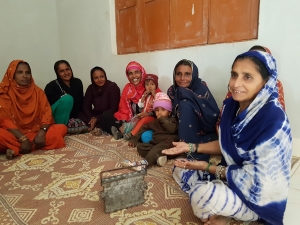Sewing and candle-making: Empowering the women of Keti Bandar
Location: Keti Bandar, Sindh Province, Pakistan. 16th Jan 2018
In the coastal town of Keti Bandar in Sindh Province, Pakistan, locals once cultivated red rice on mudflats which received abundant freshwater from the Indus River Delta, the fifth largest delta in the world. Red rice cultivation was a source of livelihood for thousands of local communities, and red rice was a major commodity exported to India and the Middle East. Rich in natural resources, Keti Bandar was thriving. Archival records even show that Keti Bandar was so prosperous that it used to extend loans to Karachi, Pakistan’s capital.
In recent decades, the construction of structures diverting water from the upstream of River Indus has resulted in a decrease in water flows into the Indus Delta. As a result of the intruding sea and increased salinity in the soil, agricultural lands have been swept away as they were no longer productive. This resulted in the cessation of red rice cultivation and a shift in livelihood dependencies from agriculture to fishing. Unfortunately, in the last few years, the lack of freshwater has led to the degradation of mangroves and fisheries resources, impacting the livelihoods of fisher folk as well.
Besides fishing, the women of Keti Bandar used to mend fishing nets to earn an income. Unfortunately, the widespread availability of factory-made nylon nets meant that the women now had fewer nets to mend.
Within households, women are also engaging in traditional embroidery. However, limited access to and knowledge of market trends mean their products are not on par with market trends, and subsequently fetch low value. Coupled with limited decision making power, the women are often left out of development planning.
As part of an MFF initiative, local NGO Centre for Environment and Development (CEAD) in collaboration with Women Entrepreneur Development Organisation (WEDO) received an MFF Small Grant with the aim of encouraging local women to participate in training and skills development activities such as candle making and sewing, engaging them in alternative income generating activities.
37 women from some of the most low-income households in Keti Bandar were trained in sewing, candle making and improved overall expertise in stitching and designing. They were also equipped with the necessary tools and materials to support the establishment of women-led household-based enterprises.

Women who receive training in sewing and candle making @IUCN/Pakistan
Some of the trainees explained that this was the first project in the town that trained local women and provided them with the right tools, materials and machines to apply their newly-acquired skills in a practical manner.“In the past, trainings were not very effective as trainees were not able to practice their skills,” said one of the trainees.
Rehana, an 18-year-old girl whose father is struggling to feed his family, learned how to sew through the project and is proud that she is able to support her family by earning additional income from selling clothes to her neighbours. She is also able to save money by stitching her own family’s clothes.
Rehana’s friend, Ghazala is also able to support her family after picking up new skills.
“I feel empowered as I can now support my mother, a housewife, and father, who is a fisherman and give pocket money to my younger brother. Earlier, I relied on my parents for everything but now I am supporting them. I can also help my family cut down on expenses by mending our clothes,” said 17 year-old Bushra who was trained in sewing skills.
Many households in Keti Bandar purchase candles to light up their houses at night, resulting in higher household costs per month. With their new candle making skills, women were able to generate a completely new income ranging between USD 7 – 18 from candle making and also save USD 6 per month which they would use to purchase candles, and are now spending to meet other household needs, such as food, health, etc.
Candles made by one of the women who received training from the programme © IUCN/ Pakistan
The project has not only empowered women economically but also empowered them socially. “ I now contribute to my family’s household income and feel respected by my family members, particularly the males,” reflected Nadia Memon, one of eleven women trained in candle making.
Rasheeda, who possessed some basic stitching skills, now feels a great improvement in the quality of her craft due to the training and feels confident about her future as a young female businesswoman. "Earlier, I used to earn USD 1 for every dress I sewed. Now I am earning twice that amount as my sewing skills have improved,” said Rasheeda.

A dress sewed by one of the women who received training from the programme © IUCN/Pakistan
While MFF and CEAD have taken the crucial first steps to integrate gender-considerations in its community-based interventions, more needs to be done. Because both women and men have unique relationships with, dependency upon, and expertise regarding their environment, there is a need to enhance the understanding of the distinct roles and contributions that both men and women bring. This would lead to an increased recognition of their needs and interests in policies and programmes, paving the way for more effective interventions.

